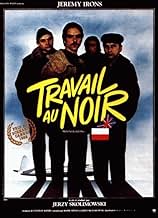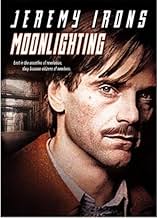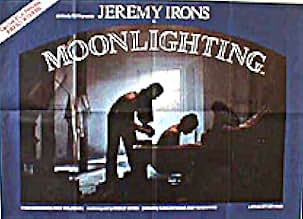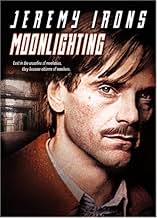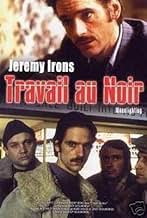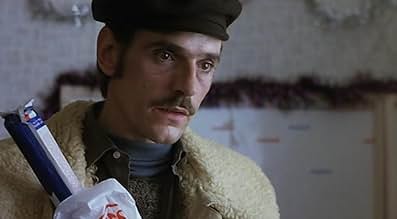IMDb-BEWERTUNG
7,3/10
3746
IHRE BEWERTUNG
Drei polnische Maurer und ihr Vorarbeiter Novak kommen nach London, um unter dem Tisch zu arbeiten.Drei polnische Maurer und ihr Vorarbeiter Novak kommen nach London, um unter dem Tisch zu arbeiten.Drei polnische Maurer und ihr Vorarbeiter Novak kommen nach London, um unter dem Tisch zu arbeiten.
- Regie
- Drehbuch
- Hauptbesetzung
- Auszeichnungen
- 3 Gewinne & 3 Nominierungen insgesamt
Jiri Stanislav
- Wolski
- (as Jirí Stanislav)
Michael Sarne
- Builders' Merchant
- (as Mike Sarne)
Empfohlene Bewertungen
The story is told by Novak's point of view. Jeremy Irons learns his Polish to play Novak in this story. He is a Polish electrician traveling with three other works to London, England before martial law was enacted in Poland in 1981. Well, anyway as a Polish American, they are believable but are seen as buffoonish and dumb even by Novak himself. If Novak had told his workers the truth, I think they would have gotten along or understood their dire consequences. Jeremy Irons gives a pretty believable performance as the working Polishman. This film resonates a quarter of a century later because many Polish men and women are legally in London and England seeking to better themselves. I understand the Polish mentality because I grew up with Polish immigrants and the notion of Poles coming just to work and earn more money in America. I could see this story actually happening but I don't think they give the other workers credit because we barely see them act as anything other than fools. It's kind of heartbreaking because Novak goes to so much trouble to spare them from the lack of money and the truth of the situation back home in Poland where he is the only one who knows only what's going on but doesn't tell his employees under his command that Poland is in political turmoil. You can't help but wonder what happens when they do go home. Can you imagine walking 6 hours to Heathrow Airport? You felt pity and foolishness for Novak's actions at the supermarket and the stores. Of course, Poles are good at surviving and I know this from my personal experience. They have survived 2 World Wars and communism. Poles' biggest problem is living and to stop worrying about money. The stereotypes of Poles like Novak trying to stretch each pence is to survive nothing more. They didn't complain about the 30 miles to Heathrow. You felt that they were out of place there. Novak wondered about his wife, Anna, and the possibility that she was probably being seduced by his employer who sent him to London in the first place to fix up the apartment. With telephone services cut down and money tight, Novak does everything he can to protect himself and his men from the dangers of the police, immigration, and even Polish government under martial law. We don't know what happens to them when they go home or if they ever do or if they are stranded in London. There are still many unanswered questions about their predicament.
My main reason for seeing 'Moonlighting' was Jeremy Irons. It was a film that was highly recommended to me being one of the few films of his that was yet to be seen despite meaning to, with those that recommended it saying that it was one of his best performances and films. And considering that he did a lot of fine work pre-'Lolita' (and of course including that performance, which was better than the film), it was something that could not be refused.
Can see whole-heartedly why 'Moonlighting' was so highly recommended, and would do the very same with fellow Jeremy Irons fans who haven't yet seen the film or with anybody looking for a non-UK/US film to watch. It really is deserving of all the praise it gets and is actually deserving of more in my view, actually know a lot of people who haven't even heard of it let alone not seen it and that really should not be the case. Always try to be subjective and hate it when so many people try to force their opinions onto others, but it does irk me sometimes when you have so many heavily marketed films that are sometimes mediocre at best or ones that are good but not that much. And then you have a film as great as 'Moonlighting', one of the best films of its year and of its subject, that despite critical acclaim is not marketed enough. In favour of films that audiences are more likely to see and have concepts and stories that they may be more likely to warm to perhaps. That should not have been, or be, the case, it deserved much better than that.
Yes the deliberate pace may test the patience for some, it is wholly dependent on the viewer, but to me that was not in any way a fault. Do think that the very end could have been rounded off a little more, though the climactic moments are powerful and the final shot is unforgettable.
Visually, 'Moonlighting' looks good. The setting has a lot of atmosphere that fits the tone of the film ideally and it's filmed with grit and style while bringing a claustrophobic edge that helped make things more powerful. Jerzy Skolimowski, exiled at the time, directs assuredly and never loses the vigour. Furthermore the script is an intelligently written one with some humorously satirical moments in deadpan fashion, and while more familiarity with the subject may help the story enthralled, entertained and moved, with a few disturbing twists in the mix like the identity of the only one who knows what's really happening in Poland. The shoplighting sequence is a major highlight, and there is a fair share of tension and poignancy.
Absolutely agree with anybody who says Irons' performance here is one of his finest, both pre-'Lolita' (and then his career became hit and miss when it became increasingly difficult to tell what to do with him or find enough roles that played to his strengths, that's my take though) and ever. It is graceful and understated but also full of authority and not many people are as good as Irons too when it comes to narration. The other performances are all great, but Irons is the one that the viewer remembers.
In conclusion, really great. 9/10
Can see whole-heartedly why 'Moonlighting' was so highly recommended, and would do the very same with fellow Jeremy Irons fans who haven't yet seen the film or with anybody looking for a non-UK/US film to watch. It really is deserving of all the praise it gets and is actually deserving of more in my view, actually know a lot of people who haven't even heard of it let alone not seen it and that really should not be the case. Always try to be subjective and hate it when so many people try to force their opinions onto others, but it does irk me sometimes when you have so many heavily marketed films that are sometimes mediocre at best or ones that are good but not that much. And then you have a film as great as 'Moonlighting', one of the best films of its year and of its subject, that despite critical acclaim is not marketed enough. In favour of films that audiences are more likely to see and have concepts and stories that they may be more likely to warm to perhaps. That should not have been, or be, the case, it deserved much better than that.
Yes the deliberate pace may test the patience for some, it is wholly dependent on the viewer, but to me that was not in any way a fault. Do think that the very end could have been rounded off a little more, though the climactic moments are powerful and the final shot is unforgettable.
Visually, 'Moonlighting' looks good. The setting has a lot of atmosphere that fits the tone of the film ideally and it's filmed with grit and style while bringing a claustrophobic edge that helped make things more powerful. Jerzy Skolimowski, exiled at the time, directs assuredly and never loses the vigour. Furthermore the script is an intelligently written one with some humorously satirical moments in deadpan fashion, and while more familiarity with the subject may help the story enthralled, entertained and moved, with a few disturbing twists in the mix like the identity of the only one who knows what's really happening in Poland. The shoplighting sequence is a major highlight, and there is a fair share of tension and poignancy.
Absolutely agree with anybody who says Irons' performance here is one of his finest, both pre-'Lolita' (and then his career became hit and miss when it became increasingly difficult to tell what to do with him or find enough roles that played to his strengths, that's my take though) and ever. It is graceful and understated but also full of authority and not many people are as good as Irons too when it comes to narration. The other performances are all great, but Irons is the one that the viewer remembers.
In conclusion, really great. 9/10
Jerzy Skolimowski's "Moonlighting" is an outstanding achievement in many respects. Not only does it contain one of the most fulfilling performances that has ever been put to the screen, but it also serves as a political allegory, a smartly-told drama, and a unique exercise in creating suspense.
On the surface, the story is rather simple: sometime in the early 80's, during the political turmoil that was occurring in Poland, a group of Polish workers emigrate to London to renovate an apartment for their boss. They have no working permits, so they have to do their job with as much secrecy as possible. When Novak (Jeremy Irons), their English-speaking foreman, discovers that military law has been declared in their homeland, he tries to keep it a secret until they are allowed back into the country.
This may not seem like much of a story compared to most modern thrillers. There are no police out to get Novak and his men, nor are there any political opponents out to assassinate them. They are simply there to do their job, and Novak has to make sure they do it effectively and on time. Small but crucial subplots develop out of this: in order to feed himself and his men, Novak has to fake receipts for food (due to the limited amount of money they brought with them), and there are several scenes where he tries to get past the clerks at a grocery store with a Christmas turkey. He also has to buy them clothes and fulfill some of their material demands. On top of that, he also begins to develop fears and worries about his wife back home, including the suspicion that his boss may be having an affair with her. As the story progresses, Novak's money runs lower and his fear and paranoia grows stronger.
Because he is the only one of them who can speak English, Novak is the only one who can communicate with the outside world. But he is also very manipulative, and serves as a symbol of a government that misled their people and kept them ignorant of many of their own problems. It is interesting to see how Skolimowski develops sympathy for poor Novak; for all his intelligence, he is still nothing more than a pawn in the hands of a corrupt government. He is a stranger in a strange land, lost and faking his knowledge of his whereabouts. It would have been difficult to make this film convincing had the lead role not been played to perfection, but Jeremy Irons does it with more grace and skill than any other actor possibly could. Much of his performance is spent in narration, subtly explaining his growing confusion and terror. There are several moments where he keeps a perfectly straight face while rambling on in his head about the grave situation he is in. His performance here holds its own in a year that also included Dustin Hoffman in "Tootsie," Ben Kingsly in "Gandhi," Gerard Depardieu in "Danton," Paul Newman in "The Verdict," Jurgen Prochnow in "Das Boot," and Jack Lemmon in "Missing."
Like Andrej Wajda (who made "Man of Marble" and "Danton"), Jerzy Skolimowski was an outspoken critic of Poland's communist regime. Curiously, he wrote the script in only a little over a day, and the whole production of the film took only a matter of months. Furthermore, the three Polish workers accompanying Novak in the story were actual Polish emigrants living (legally) in Skolimowski's home at the time military law was declared. "Moonlighting" won a well deserved screenplay award at Cannes and was nominated for the Palme d'Or.
This film is on video, but I do not think it is still being circulated. I hope they re-release it on video or DVD someday.
On the surface, the story is rather simple: sometime in the early 80's, during the political turmoil that was occurring in Poland, a group of Polish workers emigrate to London to renovate an apartment for their boss. They have no working permits, so they have to do their job with as much secrecy as possible. When Novak (Jeremy Irons), their English-speaking foreman, discovers that military law has been declared in their homeland, he tries to keep it a secret until they are allowed back into the country.
This may not seem like much of a story compared to most modern thrillers. There are no police out to get Novak and his men, nor are there any political opponents out to assassinate them. They are simply there to do their job, and Novak has to make sure they do it effectively and on time. Small but crucial subplots develop out of this: in order to feed himself and his men, Novak has to fake receipts for food (due to the limited amount of money they brought with them), and there are several scenes where he tries to get past the clerks at a grocery store with a Christmas turkey. He also has to buy them clothes and fulfill some of their material demands. On top of that, he also begins to develop fears and worries about his wife back home, including the suspicion that his boss may be having an affair with her. As the story progresses, Novak's money runs lower and his fear and paranoia grows stronger.
Because he is the only one of them who can speak English, Novak is the only one who can communicate with the outside world. But he is also very manipulative, and serves as a symbol of a government that misled their people and kept them ignorant of many of their own problems. It is interesting to see how Skolimowski develops sympathy for poor Novak; for all his intelligence, he is still nothing more than a pawn in the hands of a corrupt government. He is a stranger in a strange land, lost and faking his knowledge of his whereabouts. It would have been difficult to make this film convincing had the lead role not been played to perfection, but Jeremy Irons does it with more grace and skill than any other actor possibly could. Much of his performance is spent in narration, subtly explaining his growing confusion and terror. There are several moments where he keeps a perfectly straight face while rambling on in his head about the grave situation he is in. His performance here holds its own in a year that also included Dustin Hoffman in "Tootsie," Ben Kingsly in "Gandhi," Gerard Depardieu in "Danton," Paul Newman in "The Verdict," Jurgen Prochnow in "Das Boot," and Jack Lemmon in "Missing."
Like Andrej Wajda (who made "Man of Marble" and "Danton"), Jerzy Skolimowski was an outspoken critic of Poland's communist regime. Curiously, he wrote the script in only a little over a day, and the whole production of the film took only a matter of months. Furthermore, the three Polish workers accompanying Novak in the story were actual Polish emigrants living (legally) in Skolimowski's home at the time military law was declared. "Moonlighting" won a well deserved screenplay award at Cannes and was nominated for the Palme d'Or.
This film is on video, but I do not think it is still being circulated. I hope they re-release it on video or DVD someday.
"Moonlighting" is an engrossing film, made all the more unusual because of the
way it is treated. The basic situation is simple and somewhat routine; it's the way it unfolds that keeps interest high. The acting is fine, with Irons outstanding in the leading role. Unfortunately for me, I simply was not drawn to any of these characters by way of identifying with them. They seemed cold and self-absorbed, and in many ways quite pathetic. I felt as though I was observing rather than empathizing or becoming involved in their plight. Still, it is a very good film with strong production values.
way it is treated. The basic situation is simple and somewhat routine; it's the way it unfolds that keeps interest high. The acting is fine, with Irons outstanding in the leading role. Unfortunately for me, I simply was not drawn to any of these characters by way of identifying with them. They seemed cold and self-absorbed, and in many ways quite pathetic. I felt as though I was observing rather than empathizing or becoming involved in their plight. Still, it is a very good film with strong production values.
Moonlighting is an outstanding Polish film which deserves to be listed among top 100 world cinema films.It is a film which shows us that there are some cruel,inhuman,unjust political systems and political establishments who constantly deprive common people of earning their respective livelihoods.Moonlighting demonstrates that human life is full of misery as it can make somebody do things which one would normally not do in daily life.This is the case of a Polish foreman Novak who is in London with three construction workers known to him. For them,their work site appears more of a prison as they cannot go out.Skolimowski is as critical of the plight of clandestine workers as that of Polish government's decision to declare Martial Law.It is sad to learn that according to moonlighting some workers had to work for 18 hours a day.Anxiety,apprehension and confusion are immediately palpable to these people who have landed in London for earning extra money.For example :an airport scene shows Polish workers to be entirely dependent on Novak as he is the only person who speaks English.Touching too are the scenes in which Novak pilfers from a neighborhood supermarket.A word about Sir Jeremy Irons.He is a joy to watch as nobody expected him to play the role of Nowak with amazing inventiveness.
Wusstest du schon
- WissenswertesSkolimowski's Kensington house in West London was in real life undergoing renovation at the time the film was made. (Moonligthing, 1982)
- PatzerWhen one of the workers paints the door frame on the outside of the building and clears away the electrical wire, part of the lintel is already painted white. Later, when Banaszak climbs up the ladder, the lintel has not yet been painted. Then, in the close-up in which he gets the electric shock, a good part of the lintel is painted white again, and in the next shot, when he falls off the ladder, only a tiny part is painted white again.
- VerbindungenFeatured in At the Movies: The Best Films of 1982 (1983)
Top-Auswahl
Melde dich zum Bewerten an und greife auf die Watchlist für personalisierte Empfehlungen zu.
- How long is Moonlighting?Powered by Alexa
Details
- Erscheinungsdatum
- Herkunftsland
- Sprachen
- Auch bekannt als
- Moonlighting
- Drehorte
- Produktionsfirmen
- Weitere beteiligte Unternehmen bei IMDbPro anzeigen
Zu dieser Seite beitragen
Bearbeitung vorschlagen oder fehlenden Inhalt hinzufügen


